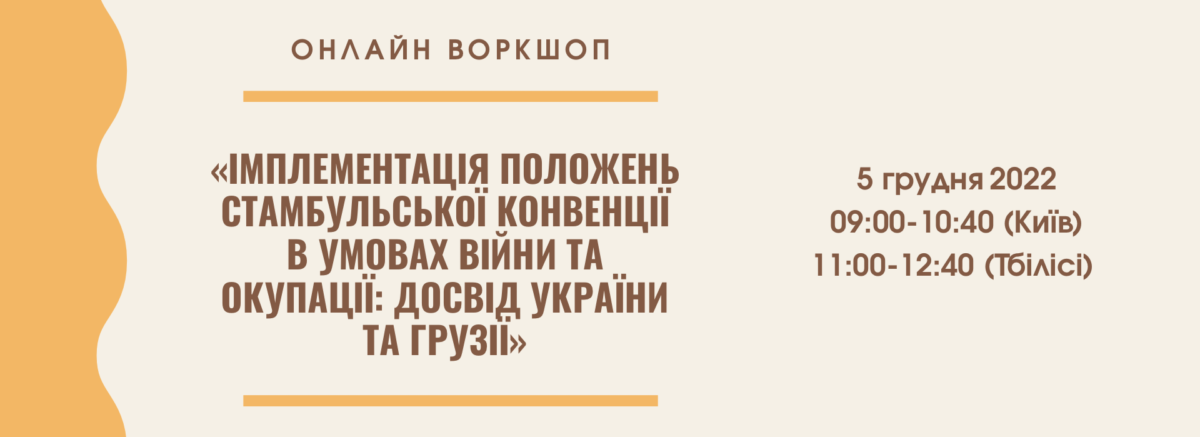Online workshop "Implementation of the provisions of the Istanbul Convention in conditions of war and occupation: Experience of Ukraine and Georgia"
On December 5, the online workshop "Implementation of the provisions of the Istanbul Convention in conditions of war and occupation: Experience of Ukraine and Georgia" was held. The event was aimed at creating a platform for experts and representatives of civil society from Ukraine and Georgia for communication and exchange of experience on countering gender-based violence during armed conflict, in particular in the aspect of implementing the provisions of the Istanbul Convention in conditions of war and occupation. During the workshop, the importance of continuing the implementation of the standards of the Istanbul Convention in both peacetime and wartime, as provided for in Article 2 of the Convention, was discussed. Special attention was paid to the difficulties in the implementation of the Convention in connection with active hostilities and as a result of the occupation in both countries, as well as ways to overcome them.
The participants from Ukraine assessed the situation with the adoption of new legislation, which should bring the legal system of Ukraine into compliance with the standards of the Istanbul Convention. In particular, in the aspect of criminalizing sexual harassment and creating better mechanisms for prosecuting sexual violence related to the conflict. It is noted that in recent months the state has developed a road map of relevant legislative changes. However, the adoption of these changes is complicated by the war situation.
The representatives from Ukraine also touched on the issue of challenges in the justice system and providing assistance to victims of various types of gender-based violence during a full-scale war. In particular, it was noted that in connection with the full-scale attack of Russia, the provision of services to the victims was reduced by almost half. However, while hostilities continue, the service system is being adapted and restored in government-controlled areas. New specialized services are also being created, such as survivor support centers, a telephone line for men who have suffered sexual violence, etc. Regarding the challenges in the justice system, the results of the recent monitoring of the response of law enforcement and judicial bodies of Ukraine to domestic violence in the conditions of war were presented. In particular, a number of gaps in the current legislation were identified, affecting the effectiveness of the state response to gender-based violence. In the conditions of war, solving these problems as soon as possible becomes even more important.
For their part, participants from Georgia shared their country's experience in implementing the provisions of the Istanbul Convention into national legislation over the past 5 years (Georgia ratified the Istanbul Convention in 2017). Although considerable time has passed since ratification, certain problematic aspects still remain. In particular, Georgian activists are still fighting for changes to the legislation regarding the introduction of the standard of consent in rape cases.
The representatives of Georgia noted that after the end of the active phase of hostilities in the state in 2008, there are still problems with the prosecution of cases of sexual violence related to the conflict committed at that time. Partly due to the lack of proper documentation of such cases. They also presented their experience of working with women living in the occupied and adjacent territories. Difficulties with informing and providing assistance to this category of victims were noted. Despite this, there were cases when they managed to successfully help survivors from the occupied territories.
Participants from Georgia spoke in detail about the state's system of support services for victims. Ukrainian men and women who are on the territory of Georgia are currently turning to shelters and crisis centers for help. The state operates a free confidential nationwide hotline for victims of violence against women and domestic violence 116 006, on which counseling is available, among other things, in the Ukrainian language. It is also possible to contact the 24-hour hotline of the Office of the Public Defender (1481). This hotline not only provides advice, but also enables direct reporting of various offences, including gender-based violence.
The online workshop was attended by representatives of the authorities, public organizations, and experts working in the field of countering gender-based violence from Ukraine and Georgia. The organizers express their gratitude Teoni Akubardia, UN Women Georgia, Agency for State Assistance to Victims of Human Trafficking, of the UN Population Fund in Ukraine, YurFem Analytical Center, HealthRight International in Ukraine for joining the event.
An online workshop was held as part of the project "Combating gender-based violence across borders: exchange of best practices between Georgia and Ukraine", which is implemented with the support of the Lund University – Swedish Institute Academy for Young Professionals (SAYP) program and is implemented by graduates of the same program in 2021 from Ukraine and Georgia (Yulia Anosova and Mariam Maharadze), in cooperation with GO "La Strada-Ukraine».

